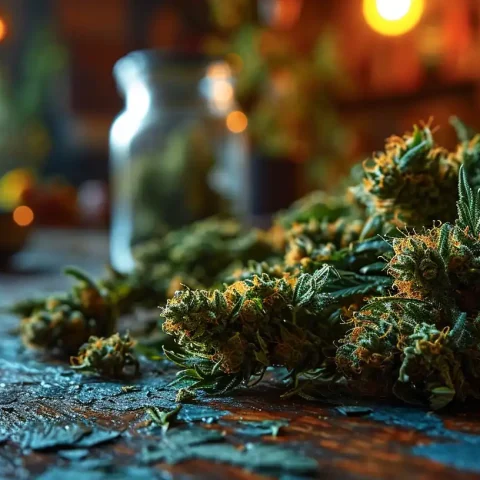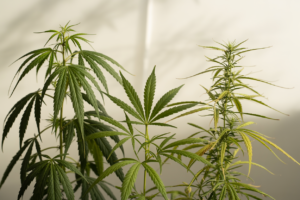Understanding Tetrahydrocannabiphorol (THCB): A Complete Guide

Contents
Contents
Introduction to Tetrahydrocannabiphorol (THCB)
THCB, a relatively new cannabinoid in the market, has been gaining attention for its unique properties and potential health benefits. In this comprehensive article, we will delve into the intricacies of THCB, exploring its differences from other cannabinoids, its potential benefits, and any associated risks or side effects. We will also discuss the various forms and methods of consumption, along with the legal implications and regulations surrounding THCB. We will explore the potential risks of using THCB and its production process, including its source and extraction methods. By the end of this article, you will have a thorough understanding of THCB, equipping you with the knowledge to make informed decisions regarding its use and implications.
Key Takeaways:
- THCB is a new cannabinoid in the market that has gained attention for its potential benefits and risks.
- Compared to other cannabinoids, THCB may offer unique benefits such as anti-inflammatory and anti-tumor properties.
- THCB can be consumed in various forms and may have legal implications depending on the regulations in your area.

What Is THCB?
THCB, also known as tetrahydrocannabiphorol, is a lesser-known cannabinoid found in the cannabis plant, belonging to the group of phytocannabinoids that has been gaining attention in medical marijuana and cannabinoid research.
THCB exhibits promising properties, with potential therapeutic effects that are being explored in various medical studies. Its interaction with the endocannabinoid system, much like other cannabis compounds, makes it a significant subject of interest. Researchers are looking into the cannabinoid effects of THCB, examining its potential as an analgesic, anti-inflammatory, and neuroprotective agent.
How Is THCB Different From Other Cannabinoids?
THCB exhibits distinct differences from other cannabinoids present in the cannabis plant, with unique chemical properties and potential effects that set it apart in cannabinoid research and the cannabis market.
What Are the Benefits of THCB?
THCB has been associated with a range of potential benefits in the realm of medical cannabis, aligning with emerging trends in the cannabis industry that emphasize therapeutic properties and novel applications.
As the demand for alternative and natural remedies continues to rise, the therapeutic potential of THCB has garnered significant attention within the medical community. Its ability to alleviate symptoms associated with chronic pain, inflammation, and certain neurological conditions showcases a promising avenue for patients seeking relief. Furthermore, THCB could offer a safer alternative to traditional pharmaceutical options, addressing concerns regarding dependency and adverse side effects.
What Are the Potential Side Effects of THCB?
While the potential side effects of THCB are still being researched, preliminary studies have begun to explore its potential effects on the human body, marking a critical aspect of cannabinoid effects research.
THCB, a lesser-known cannabinoid, has been the focus of recent investigations due to its potential impacts on the human body. Researchers are particularly interested in understanding how THCB interacts with the endocannabinoid system, which plays a crucial role in regulating various physiological processes.
Preliminary findings suggest that THCB may influence factors such as pain perception, inflammation, and appetite regulation. The exact mechanisms through which THCB exerts its effects are still not fully understood, prompting further in-depth studies to elucidate its potential implications for human health.
How Is THCB Used?
The utilization of THCB revolves around its potential applications in medical cannabis, with various consumption methods and delivery systems being explored to maximize its potential benefits.
What Forms Does THCB Come In?
THCB is available in multiple forms, necessitating comprehensive cannabinoid analysis to understand its composition and properties, a crucial aspect of advancing cannabinoid research and development.
Understanding the different forms of THCB requires thorough analysis of its cannabinoid composition. This analysis not only helps in ascertaining the purity and potency of THCB but also aids in identifying potential synergistic effects with other cannabinoids. Through techniques such as high-performance liquid chromatography (HPLC) and mass spectrometry, researchers can delve into the intricate makeup of THCB, enabling a deeper understanding of its molecular structure and potential therapeutic applications.
How Is THCB Consumed?
The consumption of THCB is aligned with its potential medical cannabis benefits, encompassing various methods such as ingestion, inhalation, and topical application, reflecting the versatility in its utilization.
The wide array of consumption methods for THCB allows individuals to choose the most suitable approach depending on their medical needs and personal preferences. Whether ingesting THCB through edibles or capsules, inhaling it through vaporization, or applying it topically via creams and lotions, these methods offer different onset times and durations, catering to diverse therapeutic requirements. These consumption techniques provide users with the flexibility to address specific health concerns, making THCB a versatile option within the realm of medical cannabis products.
What Are the Legal Implications of THCB?
The legal landscape surrounding THCB is a pivotal aspect of its presence in the cannabis industry, encompassing considerations of its legality and the regulatory framework dictating its production and distribution.
Is THCB Legal?
The legal status of THCB within the cannabis market is subject to ongoing scrutiny and regulatory considerations, reflecting the evolving nature of its legal standing.
Many jurisdictions are grappling with the complexities of regulating THCB, as it blurs the lines between pharmaceuticals and cannabis-derived products. The lack of standardized framework across different regions adds to the intricacies, with some areas permitting its sale while others prohibit it. The THCB market is also influenced by varying levels of CBD and THC content, necessitating clear guidelines to ensure consumer safety and compliance. As this landscape continues to shift, industry stakeholders and policymakers are actively involved in shaping the legal trajectory of THCB.
What Are the Regulations Surrounding THCB?
The regulatory framework surrounding THCB encompasses a spectrum of considerations within the cannabis market, spanning production standards, distribution protocols, and compliance requirements that dictate its legal utilization.
These regulations are essential to ensure the safety, quality, and legality of THCB products. Production standards dictate the cultivation processes, including aspects such as pesticide use, extraction methods, and product testing protocols. Distribution protocols involve tracking, transportation, and storage requirements, aiming to prevent unauthorized access and ensure product integrity.
Compliance requirements encompass various legal aspects like licensing, product labeling, and advertising restrictions, ensuring that THCB products meet the stipulated guidelines and standards for commercial distribution.
What Are the Risks of Using THCB?
Understanding the potential risks associated with using THCB is of paramount importance, necessitating comprehensive exploration of its effects and interactions within the scope of cannabinoid effects research.
Can THCB Cause Intoxication?
The potential for THCB to cause intoxication is a subject of ongoing investigation within the realm of cannabinoid effects, representing a critical aspect of understanding its psychoactive properties.
THCB, a lesser-known cannabinoid, has garnered attention due to its potential psychoactive effects, prompting researchers to delve into its intoxicating properties and impact on the human body. The significance of this investigation lies in the need to comprehensively comprehend the mechanisms through which THCB may induce intoxication, shedding light on the broader spectrum of cannabinoid influences. Unraveling the psychoactive nature of THCB could offer vital insights into the diverse effects of cannabinoids, furthering our understanding of their intricate interactions with the human body’s endocannabinoid system.
Can THCB Cause Addiction?
The potential for THCB to cause addiction is a notable consideration within the cannabis market, prompting in-depth evaluation of its addictive properties and implications within cannabinoid effects research.
THCB, or tetrahydrocannabivarin, is a lesser-known cannabinoid found in cannabis that has been gaining attention for its potential effects on addiction. Recent studies have indicated that THCB may interact with the endocannabinoid system in a way that could contribute to addictive behaviors.
Research suggests that THCB may influence the release of dopamine in the brain, a neurotransmitter associated with reward and pleasure, which could potentially contribute to addictive tendencies. Understanding the addictive properties of THCB is crucial in shaping regulatory measures and informing public health initiatives within the cannabis market.
Can THCB Interact with Other Medications?
The potential interactions of THCB with other medications are a critical aspect in evaluating its compatibility within the realm of medical cannabis benefits, necessitating comprehensive research into its pharmacological properties.
THCB, a relatively less-studied cannabinoid in comparison to THC and CBD, may potentially have synergistic or antagonistic effects with other medications due to its interaction with the endocannabinoid system.
This highlights the need for thorough investigation into how THCB may influence the pharmacokinetics and pharmacodynamics of other drugs, particularly in patients using medical cannabis for therapeutic purposes.
Understanding these interactions is vital for healthcare professionals to provide safe and effective treatment recommendations, underscoring the importance of incorporating THCB into ongoing research on medical cannabis benefits and drug interactions.
How Is THCB Made?
The production process of THCB encompasses its sourcing and extraction, involving intricate methods and techniques to derive this cannabinoid, marking a critical phase in cannabinoid analysis and development.
What Is the Source of THCB?
The source of THCB lies within the cannabis plant, necessitating comprehensive cannabinoid analysis to identify and isolate this compound, playing a pivotal role in advancing cannabinoid research and development.
THCB, a lesser-known cannabinoid, is found in certain strains of the cannabis plant. Its unique properties and potential therapeutic benefits make it an intriguing subject for researchers and developers. Comprehensive cannabinoid analysis is crucial in discovering the presence and concentration of THCB, enabling its isolation for further study.
By understanding the intricate composition of cannabinoids within the cannabis plant, researchers can unravel the diverse effects and applications of THCB, contributing to the progress of cannabinoid research and the development of innovative products.
What Is the Extraction Process for THCB?
The extraction process for THCB involves specialized techniques to isolate and concentrate this cannabinoid, playing a pivotal role in cannabinoid analysis and the development of novel applications within the cannabis industry.
These techniques often include advanced methods such as supercritical fluid extraction, liquid-liquid extraction, or chromatography to obtain pure THCB from the cannabis plant. Through these processes, the extraction and concentration of THCB are refined to ensure high purity and yield, making it a valuable component for research and product development. The significance of this process lies in its contribution to unraveling the potential therapeutic effects, as well as enabling the creation of innovative cannabis-based products for various industries.
Frequently Asked Questions
What is THCB?
THCB, or Tetrahydrocannabiphorol, is a new cannabinoid that has recently entered the market. It is a derivative of THC, but with unique properties and effects.
How is THCB different from THC?
THCB and THC are both derived from the same source, the cannabis plant. However, THCB has a slightly different molecular structure, which results in different effects on the body. THCB is also less psychoactive than THC, making it a more appealing option for medical use.
What are the potential benefits of THCB?
THCB is still being studied, but early research has shown that it may have anti-inflammatory and analgesic properties. It may also have neuroprotective effects and could potentially be used in the treatment of certain neurological disorders.
How is THCB consumed?
THCB can be consumed in a variety of ways, including smoking, vaporizing, and edibles. It can also be taken in the form of oils and tinctures. As with any cannabinoid, it is important to start with a low dose and gradually increase as needed.
Is THCB legal?
As with any cannabinoid, the legality of THCB varies by location. In some places, it may be legal for medical use, while in others it may be completely illegal. It is important to research and understand the laws and regulations in your area before considering using THCB.
Are there any potential side effects of THCB?
While more research is needed, early studies have shown that THCB has a low risk of side effects. However, as with any substance, there is always a risk of adverse reactions. It is important to consult with a healthcare professional before using THCB, especially if you have any pre-existing conditions or are taking any medications.
Eager to know more about THCB and its potential in the cannabis world? Continue exploring with us for in-depth information and scientific discoveries.




